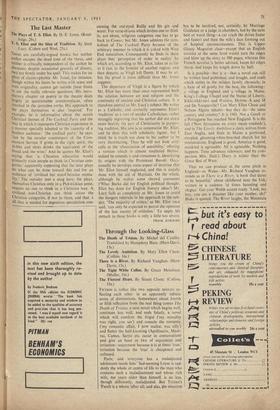The Last Master
TFIEsE are carefully-argued books, but neither author escapes the dead tone of the thesis, and neither is critically independent of the author he discusses; despite occasional gestures of dissent, they are firmly under his spell. This makes for an tifect of claustrophobia Mr. Jones, for instance, though within his limits he writes with sense and even originality, cannot get outside these limits to ask the really relevant questions. His intro- ductory chapter on poetry in the theatre deals largely in questionable commonplaces, often couched in the ipsissima verba. His approach to the plays themselves is also 'inspired.' For example, he is informative about the occult Christian themes of The Cocktail Party and the Way in which it represents Christian experience in a manner specially adapted to the capacity of a heathen audience: 'the cocktail party,' he says, can be the secular counterpart of the Com- munion Service if given in the right spirit, the tit-bits and short drinks the equivalent of the bread and the wine.' And he quotes Mr. Eliot's saying that 'a Christian education would Primarily train people to think in Christian cate- gories,' apparently supposing that the later plays do what can be done toward this end for an audience of 'civilised but non-Christian menta- lity.' The outsider sees a snag here; the plays, themselves Christian only in a Pickwickian sense, require no one to think in a Christian way. A civilised non-Christian can think about the Christian categories, if not in them, and that :s
all that is needed for ingenious speculation con- _
cerning the one-eyed Reilly and his gin and water. For verse-drama which invites one to think in, not about, religious categories one has to go back to Comas; but Mr. Jones admires the sym- bolism of The Cocktail 'Party because of the, arbitrary manner in which it is yoked with West End naturalism. Consequently he finds in these plays that 'perception of order in reality' by which art, according to Mr. Eliot, takes us as far as it can, to the frontier of another region; and then departs, as Virgil left Dante. It may be so; but the proof is more difficult than Mr. Jones suggests.
The departure of Virgil is a figure by which Mr. Eliot has more than once represented both the relation between art and religion and the continuity of ancient and Christian culture. It 's therefore central to Mr. Lucy's subject. He writes as a Catholic, and correctly represents Eliot's 'tradition' as a sort of secular Catholicism, rather strangely regretting that his author did not stres more heavily the part of Christianity in preserv- ing tradition. His aim is to systematise Mr. Eliot. and he does this with scholastic rigour; but I think he is much too close to his author to be very illuminating. Thus he will not look critiL cally at the 'dissociation of sensibility,' offering a version which is almost undiluted Nubile, indeed he extends it and romanises it, identifying its origins with the Protestant Revolt. Occa- sionally he develops some aspect of doctrine that Mr. Eliot himself neglected, and this is usually done with the aid of Maritain. On the whole. although he makes some shrewd comments ('What Burke did for English political thought, Eliot has done for English literary ideas') Mr. Lucy fails as completely as Mr. Jones to avoid the dangers inherent in his approach to the'sub- ject. 'The majority of critics,' as Mr. Eliot once said, 'can only be expected to parrot the opinions of the last master of criticism.' To apply his remark to these books is only a little too severe.
FRANK KERNIODE










































 Previous page
Previous page